
I am pretty on board with the philosophy that the author is trying to put forward, but I just really can't stand the overdone writing with all its flourishes and tangents. Another era I suppose. I'll try to find a summary of the main philosophical ideas somewhere else. DNF.
Go Set a Watchman, by Harper Lee

Gave it three or four chapters, and despite some characters that sorta seemed like they might become interesting, there just wasn't anything there that really hooked me and drew me in. It started to feel like a slog, and there's just too many other books out there to get to.
DNF.
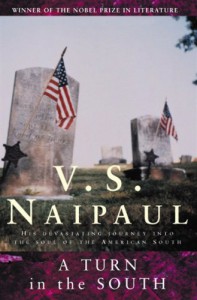
It had been hot from the beginning, from mid-April, that is, when I had gone south in Howard to see the place he thought of as home; and had been surprised by the colors of the Carolina spring, the new green of trees, the purple flowers of the roadside grass, the yellow-white dogwood blossoms; and had been further surprised by the beauty -- in rust, wood-gray, faded green, and Indian red -- of abandoned tobacco barns and derelict farmhouses and barns with peaked and spreading corrugated-iron roofs.
I picked up V.S. Naipaul's travelogue of the American South in a used bookstore in Charlottesville for a few bucks. It looked interesting, especially in the context of my recent binge of listening to the Bitter Southerner podcast and the associated thinking about the past and changing identity of the South.
I loved it.
The writing is beautifully descriptive of the people, landscapes, and buildings that grace the South, yet manages to keep the prose clean and economical as well. Naipaul is clear-eyed about a history steeped in slavery, segregation, and multi-laterial racial resentment; yet while the racial past permeates the lived present, he never lets it detract from or overshadow the beautiful things either. He also doesn't run from examining ideas and identities for which great care is required to preserve the essential truth, in whole range from nuance to outright contradiction.
A fine piece of writing. It had made me want to not only read the Naipaul's other works (I had never heard of him before this book), but also to start planning my own road trip around the region, to which I'm a recent transplant and have relatively little exposure.

Great premise and I love that it's bio hard science fiction, a sub-genre of which I wish there were more shining examples. Especially given recent advances in genetics, neuroscience, and prostheses, I feel as though there are lot of questions related to the intersection of science and society that the genre could be addressing, but isn't.
The novel was written in the late 60's, and some aspects of it haven't aged well. All of the characters with any agency are educated, scientifically-minded, white men, and it was honestly difficult to tell them apart by anything other than their names and blunt descriptions. Counterpoints were Peter Jackson and Officer Willis, who had unique and well-crafted dialogue that I enjoyed reading "aloud in my head" if that makes sense.
The exposition is fairly heavy-handed, with technical (but at least interesting) info dumps roughly every other page. Like many thrillers, this novel is overwhelmingly plot-driven, with little in the way of introspection, reflection, or emotion shown by any of the characters. However, at least the hooks are laid well throughout the story -- I definitely wanted to keep reading to find out what happened.
I'm glad to have checked off a classic I've been meaning to get to for a long time. Overall: enjoyable but dated, interesting but hardly enthralling.
 2
2
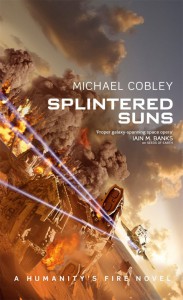
Despite the high praise on the back cover and intriguing premise, this novel left me feeling kinda meh.
The worldbuilding and the plot were at least interesting enough that I wanted to keep going for awhile, and I did manage to make it through twelve chapters before setting it aside. However, the characters are as flat as a Kiskashin's sense of humor, and often take actions that don't seem to be motivated by anything except it would lead to a gosh so cool scene or situation.
While intellectually interesting and many-layered, the plot and side-plots weren't tightly bound to a cohesive story thread enough for me to become emotionally invested in what was happening. It doesn't help that the star of the show, Brennan Pike, comes off as a happy-go-lucky cross between Han Solo, a leprechaun, and a cartoon pirate. The dialogue as-written reflects this. So annoying.
Highlights: expansive world-building, huge ancient alien starship, creative meshing of artificial and advanced biological life forms, interesting side plot that takes place inside a mind crystal
Lowlights: somehow manages to be pretty boring overall, despite all of the above
DNF (pg 252 of 483).
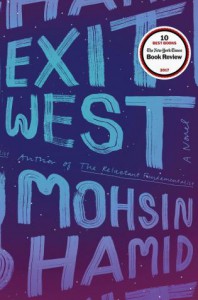
When Saeed and Nadia finally had coffee together in the cafeteria, which happened the following week, after the very next session of their class, Saaed asked her about her conservative and virtually all-concealing black rode.
"If you don't pray," he said, lowering his voice, "why do you wear it?"
They were sitting at a table for two by a window, overlooking snarled traffic on the street below. Their phones rested screen-down between them, like the weapons of desperados at parley.
She smiled. Took a sip. And spoke, the lower half of her face obscured by her cup.
"So men don't fuck with me," she said.
The quote above appears at the end of Chapter One, and sums up the essence of what I like about the novel. It does equally well as an example of what turns me off as well.
I love that the setting and characters give me a unique and interesting perspective on the world, one which I seldom have access to. They surprised me, and confronted me with assumptions and prejudices that I wasn't aware I harbored, even considering myself fairly open-minded and educated about the world. In this way, Exit West demonstrates to me that there simply aren't enough diverse voices from a Middle Eastern lens that are making it into the mainstream consciousness, leading to a limited set of narratives from which we draw our judgments and conclusions about its culture and diaspora. I appreciate that this novel expands that perspective. Further, the characters are likeable and I immediately sympathized with their position, foibles, and desires.
With such strengths, it might seem odd that I am giving a rating of 3/5 stars. The fatal flow in the novel is this: despite the unique perspective and sympathetic characters, it was hard for me to feel engaged with the story itself. The tone, while sometimes genuinely funny and surprising, often just comes off as smug and cheeky to me. The style is literary and detached; even violent deaths are described matter-of-factly, and it feels like it takes a very long time for things to happen. Given the violence and suffering of the backdrop of civil war, I found myself craving something more direct, clear, and raw to bring it home emotionally.
That, or perhaps I'm just not literary enough to appreciate the excellently crafted prose when the plot feels understated and beneath the surface... I'm no pulp reader -- lack of character depth and hacked-together stocked plots do really annoy me. I do want to think when I read, but in the sense that I want to learn something new, maybe have my mind blown, and perhaps be inspired. I don't want to be craving more connection while applauding politely, as artisan turns of phrase pirouette on by.
Overall, I'm glad this novel exists, and I don't think I wasted my time reading it... but you won't find me singing it's praises or strongly recommending it to friends.
The Three-Body Problem
 Loved it. Fantastic, mind-blowing ideas and many-layered cultural setting, social systems, and characters. My only complaints are 1) the dialogue comes off as stiff and overly-constructed (which I assume I can attribute to the difficulty of translating from Chinese), and 2) the exposition and plot advancement (especially as we begin to learn more about the Trisolarans) often feels very heavy-handed.
Loved it. Fantastic, mind-blowing ideas and many-layered cultural setting, social systems, and characters. My only complaints are 1) the dialogue comes off as stiff and overly-constructed (which I assume I can attribute to the difficulty of translating from Chinese), and 2) the exposition and plot advancement (especially as we begin to learn more about the Trisolarans) often feels very heavy-handed. Some of the best science fiction I've read in awhile. Will definitely read the sequels.
 1
1
Hillbilly Elegy: A Memoir of a Family and Culture in Crisis
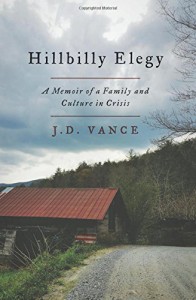 Interesting perspective from poor white America, and a heartbreaking one. It reinforced my understanding that people would be much more aligned by class than by race in America if racial tribalism weren't being actively stoked by those in power (who have every reason to ensure that the masses do not unite against the wealthy). That said, this book is repetitive and lacks the level of profundity promised by the incredible hype surrounding it. It points out real problems that have everything to do with class and persistent structural wealth inequality caused by free-market capitalism -- problems which oppress poor whites in Appalachia and poor minorities in urban cities alike -- but seems to actively avoid directly drawing this conclusion. As such, the argument falls flat and ends up coming off a bit whiny and pretentious, which is a shame because the problems described are real and important.
Interesting perspective from poor white America, and a heartbreaking one. It reinforced my understanding that people would be much more aligned by class than by race in America if racial tribalism weren't being actively stoked by those in power (who have every reason to ensure that the masses do not unite against the wealthy). That said, this book is repetitive and lacks the level of profundity promised by the incredible hype surrounding it. It points out real problems that have everything to do with class and persistent structural wealth inequality caused by free-market capitalism -- problems which oppress poor whites in Appalachia and poor minorities in urban cities alike -- but seems to actively avoid directly drawing this conclusion. As such, the argument falls flat and ends up coming off a bit whiny and pretentious, which is a shame because the problems described are real and important.
The Wright Brothers
 My first audiobook! I chose a topic of which I had prior knowledge, but I was surprised how many new things I learned from McCullough's account of the Wright brothers' journey to making the world's first controlled, powered flight in an airplane. Like all good historical nonfiction, the account interweaves the individual human level with the big picture. McCullough shows the personal lives of the Wright family as well as the broader technological and political implications and context of their work.
My first audiobook! I chose a topic of which I had prior knowledge, but I was surprised how many new things I learned from McCullough's account of the Wright brothers' journey to making the world's first controlled, powered flight in an airplane. Like all good historical nonfiction, the account interweaves the individual human level with the big picture. McCullough shows the personal lives of the Wright family as well as the broader technological and political implications and context of their work. I especially enjoy that the book is also a fine counter to the myth that genius is the product of natural talents and sudden epiphany. McCullough shows the childhood influences the brothers had to encourage tinkering and creativity, and details at length the decades of thought, experimentation, innovation, and perseverance through failure, injury, and ridicule that were necessary to arrive at their world-changing achievements. The book is as much a testament to the personal qualities and character of the whole Wright family as it is an account of their technological contribution to history.
Dune
 I've come to this book later than most, and I'm so glad I did.
I've come to this book later than most, and I'm so glad I did. I'll start with the criticism. First let me acknowledge that, as a book published in 1965, Dune contains a few elements that are likely to be problematic to the modern reader. The world depicted (which is an active choice made by the author) is almost universally patriarchal -- not just one society, mind you, but all of them, with the possible exception of one. (However, even that one, the Bene Gesserit multi-generational society of powerful sorcerer-ninja women, is incomplete and cannot fulfill its ultimate purpose until a LONG-PROPHESIED MALE CHILD is born to do what somehow none of them can.) And apropos of long prophesies, the story is definitely among the Chosen One narratives, which seem to have gone decisively out of style (at least in more literary science fiction).
All that said, I was thoroughly engrossed in the world: the captivating setting with its desert aesthetic strongly influenced by the Islamic world, the interweaving of complex politics and deep religions, and the layers upon layers of motivations and counter motivations that tear at almost any character with a name. Dune also falls within the prestigious company of those few books that I've read which manage to blend hard science fiction and fantastical elements seamlessly together in the service of evoking wonder -- such as [b:Revelation Space|89187|Revelation Space (Revelation Space, #1)|Alastair Reynolds|https://images.gr-assets.com/books/1405532042s/89187.jpg|219037] or [b:Anathem|2845024|Anathem|Neal Stephenson|https://images.gr-assets.com/books/1488349209s/2845024.jpg|6163095].
I'm hooked. I can finally understand why Dune became the genre's gold standard for science-fiction that isn't afraid to talk about the human element, and does it exceptionally well. I definitely plan to add the rest of the series to my To-Read list.
Consider Phlebas
 Such high hopes. Dropped it after chapter 3 / page 50. Characters and dialogue are beyond crap, I'm not even sure i really know what's going on or why i should care, and i actively dislike the protagonist. Reads like a cheaply made Saturday morning cartoon. People tell me the other books in the Culture worldspace are better, so I might still give them a shot.
Such high hopes. Dropped it after chapter 3 / page 50. Characters and dialogue are beyond crap, I'm not even sure i really know what's going on or why i should care, and i actively dislike the protagonist. Reads like a cheaply made Saturday morning cartoon. People tell me the other books in the Culture worldspace are better, so I might still give them a shot.
Chasm City
 Fantastic ideas and worldbuilding, but unfortunately a huge let-down after Revelation Space, which was one of the best scifi novels I've read. As this was in the same series, I hoped for more. However, I ended up calling it quits around two-thirds of the way through because the characters, dialogue, and arcs just got so bad. after the first third or so, it reads like a wandering first or second draft manuscript, which makes me wonder if it was just poorly edited or rushed to market.
Fantastic ideas and worldbuilding, but unfortunately a huge let-down after Revelation Space, which was one of the best scifi novels I've read. As this was in the same series, I hoped for more. However, I ended up calling it quits around two-thirds of the way through because the characters, dialogue, and arcs just got so bad. after the first third or so, it reads like a wandering first or second draft manuscript, which makes me wonder if it was just poorly edited or rushed to market. This would be a two star review, except that I was genuinely interested in one of the secondary side plots. The novel should have just focused on Sky Hausmann's journey to the Yellowstone system, and the dark Cold War between the ships of the flotilla. The main storyline of Tanner Mirabel falls pretty flat by comparison. Reynolds is trying to do a character novel, and that's hardly his strong suit.
I'm going to give the RS universe a couple more chances though... hopefully i find more like the original of the series.
Revelation Space
 I love stories that are able to combine large scope, hard approach to scifi tech, mythology or a spiritual element, and enough of a mystery to provide suspense. RS delivers on all of the above.
I love stories that are able to combine large scope, hard approach to scifi tech, mythology or a spiritual element, and enough of a mystery to provide suspense. RS delivers on all of the above.
Foundation
 Fascinating to see the lines connecting this work to so many others I have read. Foundational indeed. But pretty mediocre writing, flat mouthpiece characters, etc. Worth reading as ideas, not story.
Fascinating to see the lines connecting this work to so many others I have read. Foundational indeed. But pretty mediocre writing, flat mouthpiece characters, etc. Worth reading as ideas, not story.(Also: Am I the only one wondering if George Lucas really ripped off everything he did from books like this?)
David and Goliath: Underdogs, Misfits, and the Art of Battling Giants
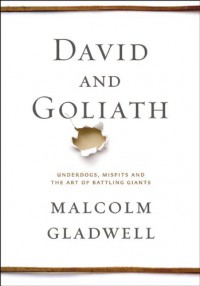 My usual Malcolm Gladwell review... fascinating anecdotes that make me think about interesting things, but with oversimplified conclusions stemming from wild extrapolations. The book is not very coherent overall either, reading very much like a draft.
My usual Malcolm Gladwell review... fascinating anecdotes that make me think about interesting things, but with oversimplified conclusions stemming from wild extrapolations. The book is not very coherent overall either, reading very much like a draft.Meh.




